Court Evidentiary Objections
Objections in a criminal court setting are essentially formal challenges made by either the prosecution or the defense during the course of a trial. They serve as a means to raise concerns about the admissibility of evidence, improper questioning, or violations of legal procedures. By objecting, attorneys aim to safeguard their client’s rights and ensure a fair and just trial.
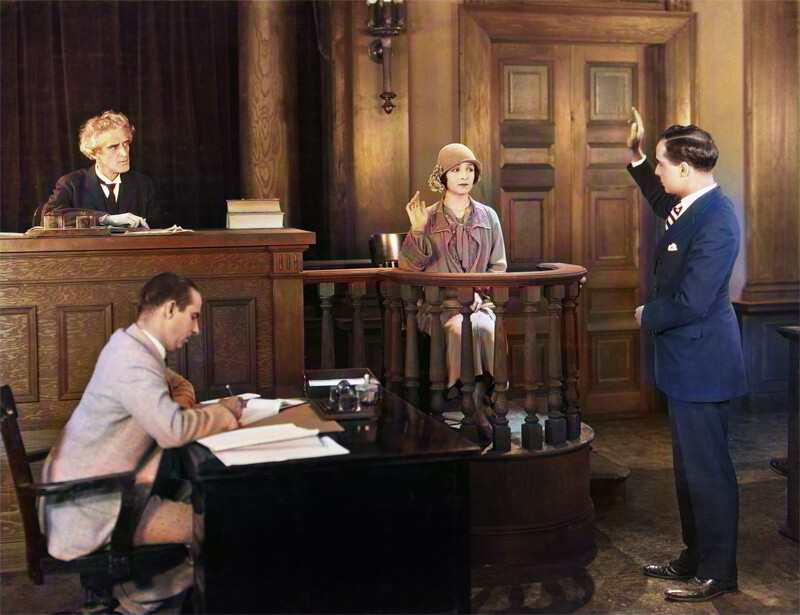
Understanding the common objections is essential for anyone involved in or interested in criminal court proceedings. These objections include:
- Hearsay: This objection is raised when a statement made outside of the courtroom is introduced as evidence to prove the truth of the matter asserted. Hearsay evidence is generally considered unreliable and inadmissible unless it falls within specific exceptions.
- Relevance: Attorneys may object if evidence or testimony being presented is deemed irrelevant to the case at hand. The relevance objection seeks to exclude information that does not have a direct bearing on establishing guilt or innocence.
- Leading the witness: When an attorney asks leading questions that suggest the desired answer, the opposing party may object. This objection aims to prevent the manipulation of witness testimony and ensures that witnesses provide their own unbiased recollection of events.
- Improper character evidence: This objection arises when one party attempts to introduce evidence about a person’s character to prove their propensity to commit a crime. Such evidence is generally inadmissible as it can create unfair prejudice or bias.
- Speculation: Objections based on speculation arise when a witness or attorney offers an opinion or inference that goes beyond their personal knowledge or expertise. This objection seeks to maintain the integrity of factual evidence and prevent unfounded assumptions from influencing the jury.
By familiarizing yourself with these common objections, you will gain a clearer understanding of the dynamics and intricacies of a criminal court trial. In the following sections, we will delve deeper into each objection, exploring their specific criteria and implications. Stay tuned for an in-depth exploration of these objections and how they shape the course of justice in criminal court proceedings.
Objection. Hearsay
In criminal court proceedings, objections play a crucial role in ensuring a fair and just trial. Among the various objections that lawyers can raise, one of the most common and noteworthy is hearsay. Understanding this objection is essential for both legal professionals and those seeking to gain insight into the criminal justice system.
“Objection, Your Honor. This testimony is hearsay. I move that the testimony be stricken from the record.” – FRE 801(a)
Hearsay refers to a statement made by an out-of-court declarant that is offered in court to prove the truth of the matter asserted. In simpler terms, it involves relying on statements made by someone who is not present in court to prove the truth of those statements. Hearsay is generally considered unreliable because it lacks the necessary safeguards of cross-examination and oath-taking.
The rationale behind the hearsay objection is rooted in the principle of fairness. In a criminal trial, the accused has the right to confront their accuser and challenge the evidence presented against them. By allowing hearsay statements without proper examination, the defendant’s ability to challenge the legitimacy and accuracy of the evidence is compromised.
To successfully object on hearsay grounds, the party making the objection must demonstrate that the statement being offered as evidence is indeed hearsay and that no exception to the hearsay rule applies. Exceptions exist when the statement falls within certain categories deemed to have sufficient indicia of reliability, such as statements made under oath, spontaneous statements, or business records.
Example of Hearsay Objections
Attorney: “Your Honor, I would like to submit this statement from John’s neighbor, who claims to have heard John say he was not at the scene of the crime.”
Opposing Attorney: “Objection, Your Honor. Hearsay. The neighbor’s statement is being offered to prove that John was not at the scene of the crime, and it is an out-of-court statement.”
Here, the objection is raised because the attorney is seeking to submit an out-of-court statement made by the neighbor regarding the cause of the accident. The statement is offered to prove the truth of the matter asserted (i.e., identifying the person responsible for the crime), and therefore, it falls under the hearsay rule.
Another Example of Hearsay Objections
Witness: “I overheard Mary telling her friend that she saw the defendant steal the purse.”
Opposing Attorney: “Objection, Your Honor. Hearsay. The witness is attempting to testify about what Mary said out of court to prove that the defendant stole the purse.”
In this instance, the objection is raised because the witness is repeating an out-of-court statement made by Mary regarding the missing item. The statement’s truth is relevant to the case, but since it was made outside the courtroom and is being offered to prove its truth, it qualifies as hearsay.
How to properly object to hearsay evidence
To properly object to hearsay evidence, defense attorneys must have a clear understanding of the rules of evidence and the exceptions to the hearsay rule. Here are a few key steps to follow when raising a hearsay objection:
- Identify the statement: Before objecting, it is crucial to identify the specific statement or evidence that is being offered as hearsay. This could be a written document, a verbal statement made by a witness, or even a statement made by a non-testifying witness.
- Determine if it meets the definition of hearsay: Once the statement is identified, analyze whether it falls within the definition of hearsay. Remember, for a statement to be considered hearsay, it must be offered for the truth of the matter it asserts.
- Identify any exceptions: Even if a statement is hearsay, it may still be admissible if it falls under an exception to the hearsay rule. Familiarize yourself with the various exceptions, such as statements made for medical diagnosis or treatment, prior inconsistent statements, or statements against interest.
- Raise the objection: When the opposing party attempts to introduce hearsay evidence, object promptly and clearly. State the specific grounds for your objection, such as “Objection, Your Honor, hearsay” or “Objection, the statement is being offered for the truth of the matter asserted.”
- Provide legal support: Back up your objection by citing relevant case law or statutory provisions that support your position. This demonstrates your knowledge and understanding of the rules of evidence.
- Be prepared for a response: The opposing party may argue that the evidence falls within an exception to the hearsay rule or that it is being offered for a different purpose. Be ready to counter their arguments and explain why the evidence should still be excluded.
Objection. Relevance
In a criminal court proceeding, objections play a crucial role in ensuring a fair and just trial. One common objection that often arises during courtroom proceedings is the objection of relevance. Understanding this objection is essential for both the prosecution and the defense to present their cases effectively.
“Objection, Your Honor, Relevance? This testimony is not relevant to the facts of this case.“
When an attorney raises an objection of relevance, they are essentially arguing that the evidence or testimony being presented is not directly related to the matter at hand. The objection is based on the principle that only evidence that is pertinent and material to the case should be allowed in court.
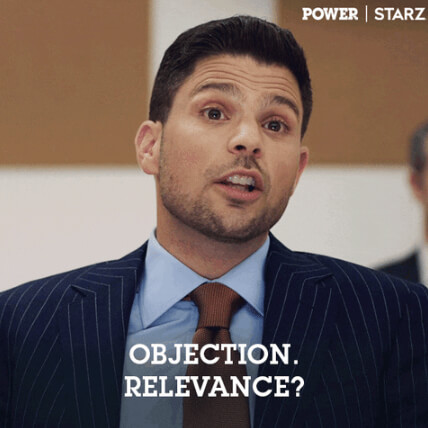
To determine whether evidence or testimony is relevant, the judge must consider its connection to the specific issue being discussed. The evidence must have a logical and significant bearing on the facts of the case, helping to prove or disprove a particular point.
These objections are made when one party believes that the evidence or testimony being presented is not directly related to the case at hand and does not have any bearing on the issues being discussed.
Here are a few situations where relevance objections may be raised:
- Personal Character: If the defense attorney attempts to introduce evidence about the defendant’s previous unrelated criminal activities or questionable character, the prosecutor may raise a relevance objection. The argument here is that this information is not relevant to the specific charges being faced by the defendant.
- Hearsay Evidence: Hearsay refers to statements made by a person who is not present in court and is being presented by someone else. If the prosecutor attempts to introduce hearsay evidence that is not directly related to the case and does not meet the exceptions outlined in the rules of evidence, the defense attorney may raise a relevance objection.
- Prior Incidents: If the prosecutor tries to introduce evidence about prior incidents or offenses committed by the defendant that are unrelated to the current case, the defense attorney may object on the grounds of relevance. The argument here is that unless these prior incidents have a direct connection to the charges in question, they should not be considered.
- Prejudicial Evidence: In some cases, evidence may be presented that is highly prejudicial and could potentially influence the jury’s decision in an unfair manner. If either party believes that the evidence being introduced is more likely to create prejudice than provide relevant information, a relevance objection may be raised.
- Time Constraints: During trial proceedings, the court aims to ensure a fair and efficient process. If the evidence being presented is time-consuming and does not have a clear connection to the case, either party may raise a relevance objection based on the argument that the evidence is not necessary for a full and fair understanding of the issues at hand.
Example of Relevance Objection
- Attorney: “Your Honor, I’d like to present the defendant’s high school grades as evidence to demonstrate that they were a diligent student.”
- Objecting Attorney: “Objection, Your Honor, Relevance? The defendant’s high school grades have no relevance to the current case, which is about a traffic accident that occurred last month. The defendant’s academic performance from years ago is not pertinent to the issues being tried.”
In this example, the objection is raised because the attorney is attempting to introduce the defendant’s high school grades as evidence, but they are not directly related to the traffic accident case. The defendant’s academic performance has no bearing on the events leading up to the accident or on determining liability or damages.
Objection. Leading
Leading questions are those that suggest a desired answer or contain information that leads the witness to a particular response. These questions often contain assumptions or provide hints that can influence the witness’s testimony. In essence, they steer the witness towards a specific narrative rather than allowing them to provide an unbiased account of the events.
“Objection, Your Honor! Counsel is leading the witness.” A question that directs the witness to a particular answer. Rule 611(c)
When an attorney objects to a leading question, they are raising a concern about the fairness and accuracy of the testimony being presented. By objecting, they are asserting that the opposing counsel is attempting to sway the witness’s testimony and potentially manipulate the outcome of the trial.
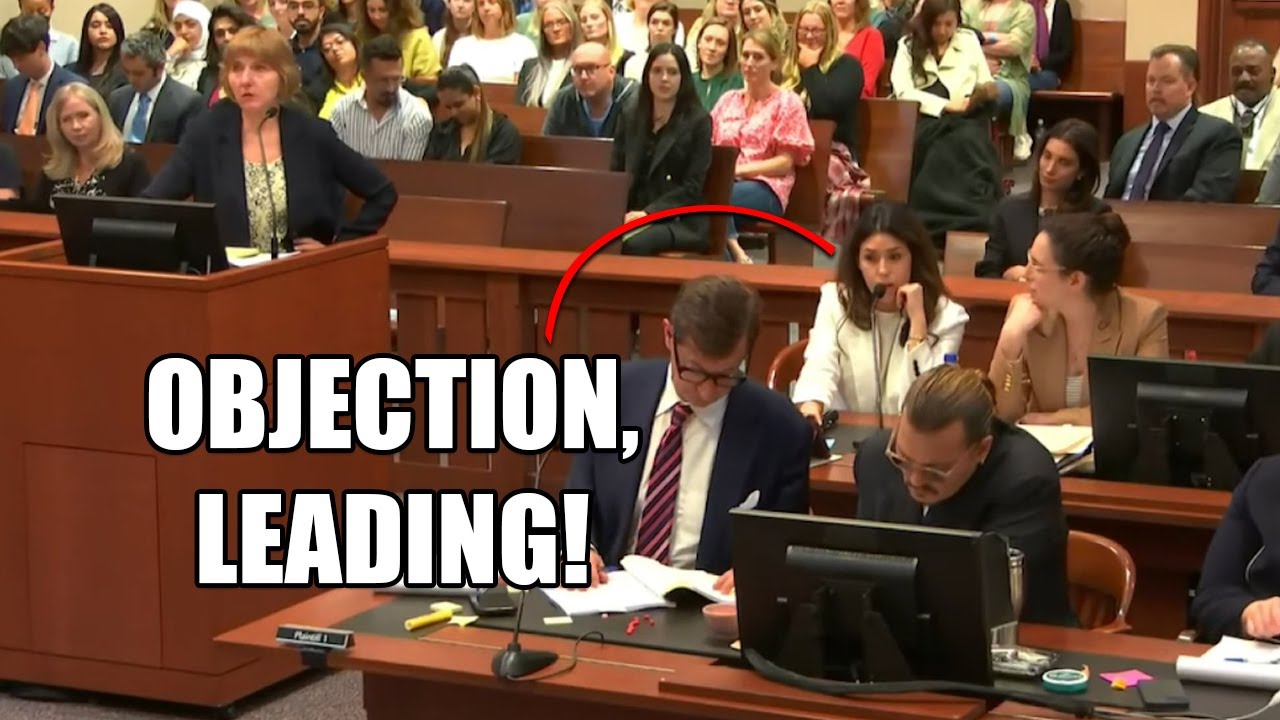
To effectively object to leading questions, attorneys must be well-versed in the rules of evidence and courtroom procedures. They must be able to identify when a question is leading and understand the specific grounds for objection. Some common objections include:
The purpose of the objection “leading”, is to ensure that witnesses are providing their testimony based solely on their own recollection and not on any outside influence or manipulation. This objection helps uphold the principle of fairness, as it prevents attorneys from coercing witnesses into providing predetermined answers that may not align with their true experiences.
- Cross-examination: Leading questions can be used during cross-examination to challenge the credibility or accuracy of a witness’s testimony. By strategically framing questions that subtly guide the witness towards a certain response, attorneys can expose inconsistencies, biases, or ulterior motives. This technique is particularly useful when dealing with hostile or uncooperative witnesses who may be reluctant to provide truthful or complete information.
- Expert witness. These witnesses are often called upon to provide specialized knowledge or opinions in their field. By using leading questions, attorneys can guide the expert through complex concepts or technical details, ensuring that the jury and other participants fully understand the expert’s testimony.
Example of Leading Question Objection
- Attorney: “You were at the scene of the crime last night, right?”
- Witness: “Yes.”
- Attorney: “And you saw the defendant stealing the money, correct?”
- Objecting Attorney: “Objection, Your Honor, leading question. The attorney is suggesting the desired answer to the witness. It’s not appropriate during direct examination.”
In this example, the objection is raised because the attorney is guiding the witness to answer in a specific way. The use of phrases like “right?” and “correct?” in the question implies the answer the attorney wants to receive. During direct examination, the attorney should generally avoid leading questions to allow the witness to provide their testimony in their own words, without any influence or bias.
Objection. Speculation
Speculation occurs when a statement or question is asked that requires a witness or the opposing party to speculate or guess about something that is not supported by factual evidence or personal knowledge. This objection is raised to prevent the introduction of unreliable or unfounded information that could potentially sway the jury or confuse the facts of the case.
“Objection, Your Honor. Calls for Speculation. Move to Strike.“
When an objection of speculation is raised, the opposing party is essentially challenging the relevance and credibility of the testimony or evidence being presented. The objecting party argues that the statement or question is based on assumptions or conjecture rather than concrete facts or firsthand knowledge.
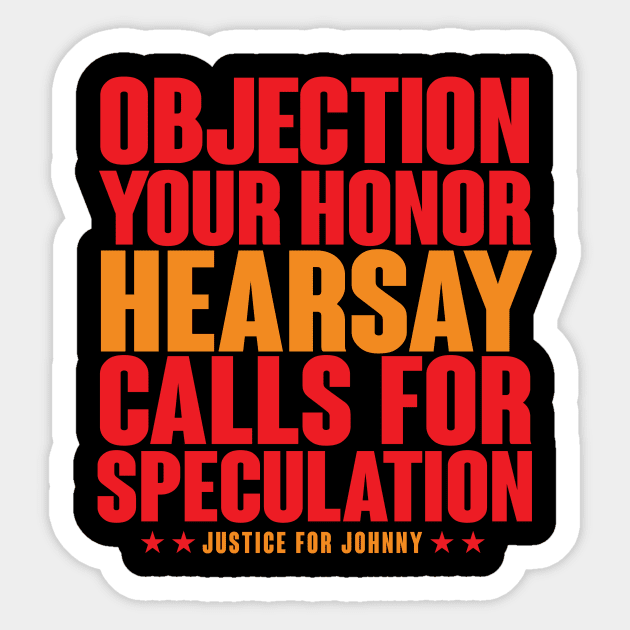
Examples of Speculation Objection
- Attorney: “In your opinion, how fast do you think the defendant’s car was traveling at the time of the accident?”
- Witness: “Hmm, I’m not sure, but maybe around 100 miles per hour.”
- Objecting Attorney: “Objection, Your Honor, speculation. The witness is not an expert in accident reconstruction, and their response is purely speculative. They do not have the necessary expertise to accurately determine the speed of the defendant’s car at the time of the accident.”
In this example, the attorney is objecting because the witness is providing an opinion about the speed of the defendant’s car without having the necessary expertise or factual basis to make such an assessment. The witness is merely speculating about the speed, which is not permitted in testimony.
Objection. Argumentative
Being argumentative refers to the act of making statements or asking questions that are intended to provoke an emotional response or engage in a heated debate rather than focusing on presenting relevant evidence or logical arguments. This type of behavior can be disruptive to the proceedings and may hinder the search for truth and justice.
“Objection, Your Honor. Counsel is being argumentative.” – Rule 611(a)(3)
An objection to being argumentative aims to maintain the decorum and fairness of the courtroom. It helps prevent attorneys from engaging in unnecessary confrontations or using aggressive tactics to manipulate the jury or the judge’s perspective.
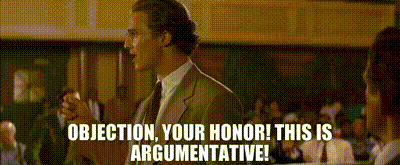
When an objection of being argumentative is raised, the attorney who made the objectionable statement or asked the objectionable question should rephrase or reframe their argument or question in a more neutral and non-confrontational manner. This allows the attorney to convey their point without crossing the line into argumentative territory.
Objection. Compound Question
A compound question is a question that combines multiple inquiries into one, making it difficult for the witness to provide a clear and accurate response.
“Objection, Your Honor, compound question. The question combines multiple inquiries, making it difficult for the witness to answer accurately.” – Rule 611(a)(1)
Compound questions can be problematic for several reasons. Firstly, they can confuse the witness, leading to a muddled or incomplete answer. Secondly, a compound question may encompass multiple issues, making it challenging for the opposing counsel to effectively cross-examine or address each component separately. Lastly, compound questions can potentially be misleading or biased, as they can elicit responses that may not accurately represent the witness’s true knowledge or perspective.
When a compound question is posed during a trial, the opposing counsel has the right to raise an objection. The purpose of this objection is to request the court to instruct the questioning attorney to rephrase or break down the question into simpler and more precise parts. By doing so, the witness can provide clear and concise answers, and the opposing counsel can address each issue effectively.
Example of Compound Question Objection
- Attorney: “Did you witness the car accident, and can you describe what the driver was doing on their phone at the time of the collision?”
- Objecting Attorney: “Objection, Your Honor, compound question. The attorney is asking two separate questions within one inquiry: whether the witness witnessed the car accident and what the driver was doing on their phone. This could lead to confusion and does not allow the witness to provide a clear and distinct answer to each part.”
In this example, the objection is raised because the attorney’s question combines two distinct inquiries into one sentence. The witness may have witnessed the car accident but might not have observed what the driver was doing on their phone. By objecting, the opposing attorney is requesting that the original question be rephrased into two separate questions to ensure that the witness can answer each part individually and accurately. The judge will then rule on the objection and may ask the attorney to rephrase the question accordingly.
Objection. Improper Character Evidence
In criminal court proceedings, objections play a crucial role in ensuring a fair and just trial. When it comes to character evidence, objection #5 on our list, it is important to understand its implications and why it is often objected to in the courtroom.
“Objection, Your Honor, improper character evidence. The prosecution is attempting to introduce the defendant’s prior criminal record.” – Rule 404(a)
Character evidence refers to the introduction of evidence that is meant to establish a person’s general character or disposition. This can include evidence of their reputation, opinion evidence from others, or specific instances of conduct that demonstrate their character traits. However, objections often arise when character evidence is introduced because it can be both prejudicial and irrelevant to the case at hand.
One common objection to character evidence is based on Rule 404 of the Federal Rules of Evidence, which states that character evidence is generally not admissible to prove a person’s conduct on a particular occasion. This means that a person’s past actions or reputation should not be used to prove guilt or innocence in the current case.
The rationale behind this objection is to prevent the jury from making decisions based on a person’s character rather than the specific evidence and facts presented in the trial. Allowing character evidence could lead to unfair and biased judgments, as it may create a perception of guilt or innocence based on unrelated or irrelevant information.
Example of Improper Character Evidence Objection
- Attorney: “Isn’t it true that the defendant has a reputation for being dishonest and untrustworthy in the community?”
- Objecting Attorney: “Objection, Your Honor, character evidence. The question seeks to elicit evidence about the defendant’s character, which is not relevant to the charges in this case. The defendant’s reputation for honesty or trustworthiness is not a valid basis for determining their guilt or innocence in this matter.”
In this example, the attorney is objecting to the question that asks about the defendant’s reputation for dishonesty. Such character evidence is generally not admissible to prove the defendant’s guilt in the current case. The judge will rule on the objection based on the specific circumstances of the case and the relevant rules of evidence.
There are exceptions to the general rule against character evidence. For example, in some cases, the prosecution may introduce evidence of the defendant’s prior bad acts to show a pattern of behavior or modus operandi, but there are specific rules and limitations on when and how this type of evidence can be presented.
Objection. Lack of Foundation
When an attorney raises a lack of foundation objection, they are essentially arguing that the opposing party has not established the necessary groundwork or context for the evidence being presented. In other words, the attorney is asserting that there is no proper foundation upon which the evidence can be admitted.
“Objection, Your Honor, lack of foundation. The proponent has not established the necessary foundation for the admission of this evidence.“
To understand this objection better, let’s consider an example. Imagine a prosecutor presenting a witness who claims to have seen the defendant commit a crime. However, the defense attorney objects, citing a lack of foundation. In this case, the defense is asserting that the prosecution has not adequately established the witness’s ability to identify the defendant or their vantage point at the time of the alleged crime. Without this essential foundation, the witness’s testimony may be deemed unreliable or inadmissible.
To overcome a lack of foundation objection, the party presenting the evidence must provide sufficient supporting information, testimony, or documentation to establish the necessary background or context. This could involve presenting additional witnesses, providing relevant documentation, or asking the witness specific questions to establish their credibility and firsthand knowledge.
Example of Lack of Foundation Objection
- Attorney: (During cross-examination of a witness) “So, you claim that you saw my client at the scene of the incident on the night of the alleged crime?”
- Witness: “Yes, that’s correct.”
- Attorney: “And how far away were you from my client when you saw them?”
- Witness: “Um, I’m not sure, maybe about 100 feet.”
- Attorney: “Did you have any visual obstructions or difficulties in seeing my client from that distance?”
- Witness: “Well, it was dark, and there were some bushes around, but I could still see them clearly.”
- Attorney: “Objection, Your Honor, lack of foundation. The witness has not established that they had adequate visibility to identify my client from that distance under the given conditions. We have no information on the lighting, the witness’s eyesight, or their familiarity with my client’s appearance. Without a proper foundation for their visual perception, their testimony is unreliable and should be excluded.”
In this example, the defense attorney is objecting to the witness’s testimony about seeing the defendant at the scene based on “lack of foundation.” The attorney argues that the witness has not provided enough context or information to show that their identification of the defendant from a distance of 100 feet in the dark with some obstructions is reliable. The objection aims to challenge the credibility and admissibility of the witness’s statement. The judge will then consider the objection and decide whether to sustain it or allow the testimony to stand based on the presented arguments and applicable rules of evidence.
Objection. Calls for a Legal Conclusion
When an attorney asks a witness to provide a legal conclusion, they are essentially asking the witness to interpret the law and apply it to the facts of the case. This is not the role of a witness, as witnesses are only supposed to provide factual information based on their observations or experiences.
“Objection. Calls for a Legal Conclusion.” Only a witness who is an attorney can make a legal conclusion. – Rule 701
The purpose of this objection is to prevent witnesses from offering their personal opinions or interpretations of the law. The judge wants to ensure that the case is decided based on the facts and the law, rather than individual opinions.
When this objection is sustained, it means that the judge agrees with the objection and prohibits the witness from answering the question or making the legal conclusion. The attorney may need to rephrase the question in a way that elicits a factual response or request the court to allow expert testimony to provide a legal conclusion.
Example of Calls for a Legal Conclusion Objection
- Attorney: “Did you witness the defendant striking the plaintiff?”
- Witness: “Yes, I saw the defendant hit the plaintiff with a closed fist.”
- Attorney: “And based on what you saw, do you believe that the defendant committed assault?”
- Objecting Attorney: “Objection, Your Honor, calls for a legal conclusion. The witness is being asked to provide an opinion on whether the defendant committed assault, which involves interpreting the law. Witness testimony should be limited to what they observed, not legal opinions.”
In this example, the attorney is objecting because they believe that the question posed to the witness is asking them to draw a legal conclusion (i.e., determining whether the defendant committed assault). Legal conclusions are the domain of the judge or jury, not witnesses. Witnesses should only testify about what they directly observed or experienced, leaving the legal analysis and application to the attorneys and the court.
The judge will then rule on the objection, either sustaining it and instructing the witness not to answer the question or overruling it and allowing the witness to answer. If the objection is sustained, the attorney may rephrase the question to ask for a factual account of what the witness saw without seeking a legal opinion.
Objection. Non-Responsive
This objection is typically made when a witness or the opposing party fails to directly answer the question that has been posed to them.
When an attorney asks a specific question, they expect a direct and relevant response. However, there are instances when the witness veers off course or provides information that is not directly related to the question at hand. This can be frustrating for both the attorney asking the question and the judge presiding over the case.
“Objection, Your Honor. The witness is being nonresponsive.” – Rule 611(a)(1)
The purpose of the objection of “non-responsive” is to bring the witness back on track and ensure that they are providing the information that is being sought. By objecting to a non-responsive answer, the attorney is indicating to the court that the witness is not directly addressing the question and may be introducing irrelevant or misleading information.
Upon hearing this objection, the judge will typically sustain it and instruct the witness to provide a direct and responsive answer to the question. The witness will then be given an opportunity to rephrase or clarify their response, focusing on the specific question that was asked.
The objection of “non-responsive” serves an important purpose in maintaining the integrity of the courtroom proceedings. It ensures that the evidence being presented is relevant and directly addresses the issues at hand. By keeping the witness accountable for their answers, this objection helps to maintain a fair and efficient trial process.
Example of Non-responsive Objection
- Attorney: “Did you see the defendant at the store on the night of the incident?”
- Witness: “Well, I went to the store to buy some groceries, and I parked my car in the parking lot. When I got inside, I saw my friend, Sarah, and we had a chat for a while. Then, I went to the produce section to pick up some fruits and vegetables. I think it was around 9:00 PM. As I was walking towards the checkout, I noticed a commotion near the entrance, and people were talking about a robbery. So, I left my shopping cart and quickly walked outside to see what was happening, and that’s when I saw the defendant running away from the store.”
- Attorney: “Objection, Your Honor, non-responsive. The witness was asked a simple yes or no question: did they see the defendant at the store on the night of the incident? Instead, the witness has given a narrative of their entire trip to the store, which does not directly answer the question.”
In this example, the witness goes into unnecessary details and provides a long narrative without directly answering the attorney’s question about seeing the defendant at the store. The attorney objects to the witness’s response as “non-responsive” because it does not address the specific inquiry, and it may also be an attempt to avoid providing a direct answer. The judge will then decide whether to sustain or overrule the objection, and the attorney may ask the witness to provide a more concise and direct answer to the original question.
Judges Ruling on Objections
When it comes to objections in a criminal court setting, the role of the judge is crucial. The judge acts as the ultimate decision-maker, responsible for ruling on objections made by both the prosecution and the defense. Their role is to ensure that the trial proceeds fairly and in accordance with legal principles.
In ruling on objections, the judge must carefully consider the arguments presented by both sides. They assess the relevance, admissibility, and potential prejudicial impact of the evidence being objected to. While judges have the power to overrule or sustain objections, their decisions are guided by the rules of evidence and the principles of justice.
Sustained Objection
The judge’s ruling on objections can significantly impact the outcome of a trial. A sustained objection means that the evidence or line of questioning objected to is deemed inadmissible or improper, and it cannot be considered by the jury. This can have a significant effect on the overall strength of a case.
Objection Overruled
On the other hand, if an objection is overruled, it means that the evidence or line of questioning objected to will be allowed to be presented or pursued. This can potentially strengthen or weaken the case being presented by either the prosecution or the defense.
Conclusion
We hope that our blog post on demystifying criminal court objections has provided you with valuable insights into the five most common objections that arise in the courtroom. Understanding these objections is crucial for anyone involved in the criminal justice system, whether you are a lawyer, defendant, or simply interested in the legal process.
By familiarizing yourself with these objections, you can navigate the courtroom with confidence and better advocate for your case. Remember, knowledge is power, and we are confident that armed with this knowledge, you can achieve justice in the courtroom.




